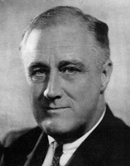
Return to U.S. Presidency - Index Page.
Return to U.S. Presidents' Biographies Page.
Born: 1/30/1882
Birthplace: Hyde Park, N.Y.
Franklin Delano Roosevelt was born in Hyde Park, N.Y., on Jan. 30, 1882. A Harvard graduate, he attended Columbia Law School and was admitted to the New York bar. In 1910, he was elected to the New York State Senate as a Democrat. Reelected in 1912, he was appointed Assistant Secretary of the Navy by Woodrow Wilson the next year. In 1920, his radiant personality and his war service resulted in his nomination for vice president as James M. Cox's running mate. After his defeat, he returned to law practice in New York. In August 1921, Roosevelt was stricken with infantile paralysis while on vacation at Campobello, New Brunswick. After a long and gallant fight, he recovered partial use of his legs. In 1924 and 1928, he led the fight at the Democratic national conventions for the nomination of Gov. Alfred E. Smith of New York, and in 1928 Roosevelt was himself induced to run for governor of New York. He was elected, and was reelected in 1930.
In 1932, Roosevelt received the Democratic nomination for president and immediately launched a campaign that brought new spirit to a weary and discouraged nation. He defeated Hoover by a wide margin. His first term was characterized by an unfolding of the New Deal program, with greater benefits for labor, the farmers, and the unemployed, and the progressive estrangement of most of the business community.
At an early stage, Roosevelt became aware of the menace to world peace posed by totalitarian fascism, and from 1937 on he tried to focus public attention on the trend of events in Europe and Asia. As a result, he was widely denounced as a warmonger. He was re-elected in 1936 over Gov. Alfred M. Landon of Kansas by the overwhelming electoral margin of 523 to 8, and the gathering international crisis prompted him to run for an unprecedented third term in 1940. He defeated Wendell L. Willkie.
Roosevelt's program to bring maximum aid to Britain and, after June 1941, to Russia was opposed, until the Japanese attack on Pearl Harbor restored national unity. During the war, Roosevelt shelved the New Deal in the interests of conciliating the business community, both in order to get full production during the war and to prepare the way for a united acceptance of the peace settlements after the war. A series of conferences with Winston Churchill and Joseph Stalin laid down the bases for the postwar world. In 1944 he was elected to a fourth term, running against Gov. Thomas E. Dewey of New York.
On April 12, 1945, Roosevelt died of a cerebral hemorrhage at Warm Springs, Ga., shortly after his return from the Yalta Conference. His wife, (Anna) Eleanor Roosevelt, whom he married in 1905, was a woman of great ability who made significant contributions to her husband's policies.
Died: 4/12/1945


